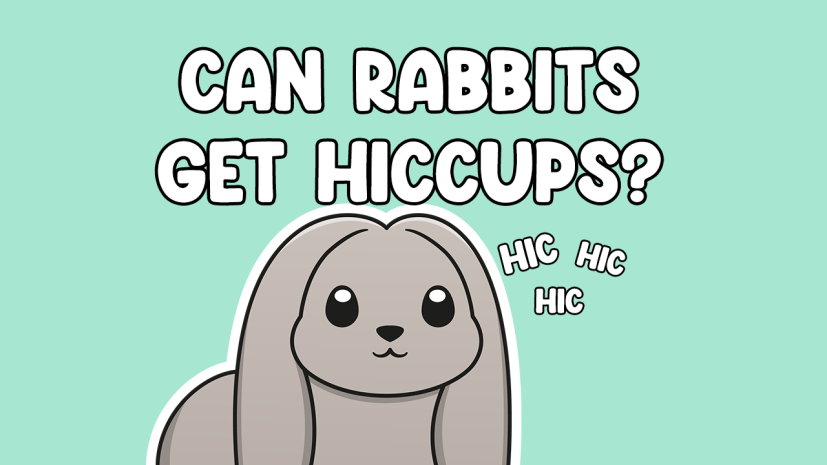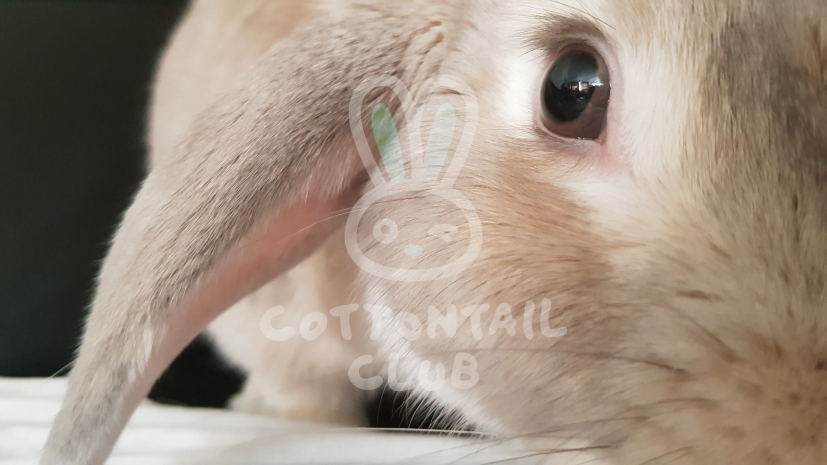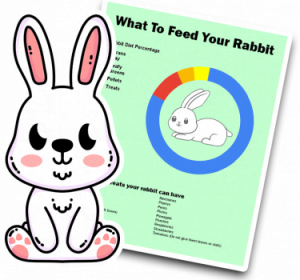
One common question that arises within the rabbit owner sphere is: “Can rabbits get hiccups?” This query underlines the need for rabbit owners to understand their pet’s behaviors and health symptoms. This article will guide you through the fascinating world of rabbit hiccuping.
Yes, Rabbits can get hiccups, though they may not look or sound exactly like the hiccups we humans experience. In rabbits, hiccups manifest as rapid, rhythmic contractions in the abdominal area, which soft noises may accompany. These hiccups are typically the result of the involuntary contraction of a muscle called the diaphragm located beneath the lungs.

The diaphragm, a sheet of muscle under the lungs, plays an important role in respiration. When the diaphragm contracts, it creates a vacuum that draws air into the lungs. When it relaxes, it pushes air out. Hiccups occur when this diaphragm muscle spasms, resulting in a sharp intake of breath that is then cut off by the closing of the vocal cords, creating the characteristic ‘hic’ sound.
For rabbits, the mechanism is quite similar. Their diaphragm muscle can spasm, causing a sudden and involuntary intake of breath. However, due to their distinct anatomy and the fact that rabbits are obligate nasal breathers (meaning they primarily breathe through their noses), the hiccup sound may not always be present or recognizable in the same way as in humans.
While there are several potential causes for hiccups in rabbits, some of the most common ones are related to their feeding habits. For instance, eating or drinking too quickly can cause a rabbit to swallow air, which may trigger hiccups.
Likewise, consuming certain types of food can also lead to hiccups, especially if those foods cause gas or bloating. Preventing or mitigating these causes primarily involves adjusting the rabbit’s diet and feeding habits.
Observing your rabbit’s behavior closely can help you identify if it is experiencing hiccups. While it may be hard to distinguish hiccups from other behaviors, some symptoms can help point you in the right direction.
While these symptoms might indicate hiccups, they could also be signs of more severe health issues. For instance, a lack of appetite and trouble with toilet habits could suggest gastrointestinal issues, while teeth grinding could indicate pain from various causes. As such, it’s important to monitor your rabbit closely and consult with a veterinarian if these symptoms persist.
Moreover, if you are uncertain whether your rabbit is experiencing hiccups or merely shivering, you can gently examine your bunny by touching them all over, we suggest small rotating belly massages. Rabbits experiencing hiccups typically show rhythmic contractions in the abdominal area, a pattern not present when shivering.
Hiccups in rabbits are typically harmless and tend to resolve on their own. However, if your rabbit seems to be uncomfortable, you can employ a few techniques to help alleviate the situation.
Rub their diaphragm: One method you could consider is assisting your rabbit’s diaphragm, the muscle involved in breathing. To do this, gently place two of your fingers on your rabbit’s diaphragm, found just below the heart and above the liver. Once you’ve located the diaphragm, apply a light pressure with your fingers. This action might help dislodge any trapped air, alleviating the hiccups. However, remember to be extremely careful as rabbits are sensitive to touch, particularly on their underside.
Avoid Scaring them: While trying to help your rabbit, it’s essential to avoid practices that might scare them. For example, never hold your rabbit’s nose to make it hold its breath. Similarly, attempting to scare the hiccups out of your rabbit is not a recommended approach. These methods could significantly distress your rabbit and damage the trust between you both.
Time: Patience is key when dealing with hiccups in rabbits. With time, your rabbit’s hiccups will typically cease on their own. This approach is preferable to interfering and potentially causing distress or harm to your pet.
Monitor them closely: If the hiccups persist for an extended period or are accompanied by other symptoms such as a loss of appetite, sneezing, discharge from the eyes or nose, reluctance to be picked up, or a hard belly, it’s critical to consult with a veterinarian. These symptoms could indicate more serious underlying conditions such as respiratory diseases or digestive blockages, which can have severe implications on your rabbit’s health.
Like in humans, hiccups are usually harmless for rabbits. However, persistent hiccups may indicate a more serious underlying health issue, such as gastrointestinal problems. If your rabbit experiences persistent hiccups, it’s best to seek veterinary care.
Unfortunately, another owner on Reddit has experienced the sad loss of their rabbit from perpetual hiccups, which was either due to or caused by an internal infection in the lungs.
Tonight we had to say goodbye to our boy Simba.
He had been suffering with hiccups for almost a month and no one could figure out why. About 10 days ago he started having trouble with his breathing and was put on antibiotics.
/u/Colcancerman
Immediate veterinary attention is warranted if hiccups are accompanied by other unusual symptoms like loss of appetite, lethargy, or changes in droppings.
Your bunny could be having hiccups for several reasons, the most common being eating or drinking too quickly. However, if hiccups persist, it may be a sign of a more serious issue and should be checked by a vet.
In most cases, hiccups are harmless and will resolve on their own. However, if they persist or are accompanied by other symptoms, seeking veterinary care is advisable.
To prevent hiccups, try to regulate your rabbit’s eating habits, ensure they aren’t eating or drinking too quickly, and monitor their diet to avoid foods that may cause gas or bloating. If your rabbit has a history of being prone to GI Stasis, give them liquid simethicone, also called “baby gas drops”.

By entering your email address you agree to receive emails from Cottontailclub. We'll respect your privacy and you can unsubscribe at any time.